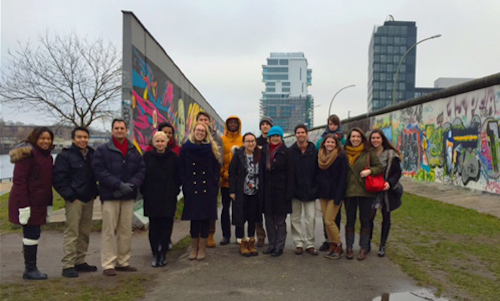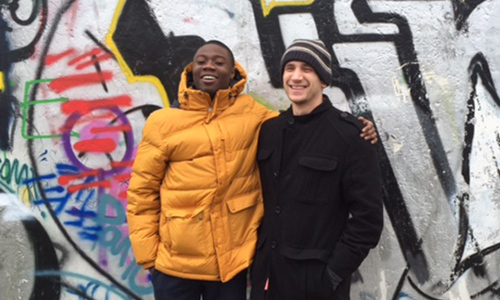What would it mean if home became a place forbidden to you? For residents of divided cities, such an experience is commonplace. A Denison Seminar, titled “Divided Cities in Film and History,” explores the impact of ruptured space on the lives of people in three divided cities: Berlin, Germany; Belfast, Northern Ireland; and Nicosia, Cyprus. The course uncovers the tactics that political antagonists use to impose their views on aesthetics and collective memory.
In the fall of 2014, students studied urban division in a European context through the lenses of film and history. At the end of the semester, the class traveled to Berlin to research effects of political division in situ.
The class attracted students from a wide range of majors, including history, cinema, biochemistry and communication. For Sara Vincent ’16, it allowed each student to bring a unique perspective to the same topic.
“When we would discuss historical topics in class, our different majors often impacted how we thought about the event,” Vincent said. “Everyone always had a different angle behind their arguments, so the course was naturally multifaceted.”
While in Berlin, the group explored the city and toured several sites of historic significance’ including the Soviet war memorial in Treptower Park; the Reichstag, the German Parliamentary building; the Stasi prison Hohenschoenhausen; the concentration camp Sachsenhausen; and several museums.
Ricardo Antonio ’16, a biochemistry major, relished the opportunity to go abroad with Dollard, who is his Posse mentor.
“We had really rich discussions around the dinner table, sometimes a lot of a laughter and talking about life,” said Dollard. “We also talked about these questions of where does political power intersect with individual experience. Is it just particular moments in history, or does it pervade time?”
“At the end of the day, when we got to go on top of the Reichstag, the view was amazing. The sun was setting, it was a perfect temperature, and you could see the entire city of Berlin,” said Antonio.
Upon their return to Denison, the students completed travel journals — visual and written compilations of their experiences — with materials collected in Germany, photographs with captions and reflections on how the tour expanded their knowledge.
“We gained a better sense of Berlin and its structure from this tour,” said Jingwen Liu ’16 from Wuhan, China. “We could see everything we learned about the buildings and architecture from the articles we read. The divide feels so much more real.”
Bussan and Dollard share an interest in the way place shapes experience. Both are Denison alumni and, in returning to their alma mater as faculty, have had the opportunity to reflect on how the contours of a familiar place can be reshaped by changing roles and circumstances.
The chaotic stories of Berlin, Belfast, and Nicosia have proven a fertile context by which to explore the relationship of the individual to political, social and personal space. The two instructors researched the seminar through a 2010 grant from the Mellon Foundation, which brought 10 faculty members to Cyprus and Germany. The grant ultimately led to several collaborations, a significant amount of scholarship and new classes.
“Divided Cities in Film and History” is one of those classes. It was created under the auspices of the Denison Seminars program, which provides students and faculty with an enriching travel component and the added challenge of team teaching,
“Some people think co-teaching means only preparing for half a class, but you’re really doing twice as much. You have to research things outside your purview,” said Bussan. “Then you get together with your partner and figure out how you’re going to teach a topic via a much wider scope.”
“Transcending our obvious academic divisions, Dave and I both have a deep interest in the meanings of place and how that forms identities,” Dollard said.







